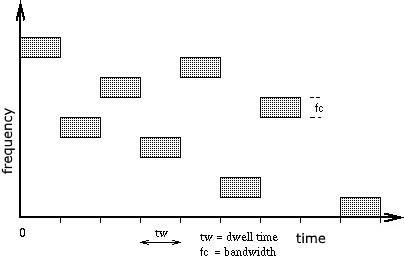IEEE 802.11 Wireless Modulation Methods
By Stephen Bucaro
A "Modulation Method" is a format and data rate in which wireless data is sent over the air.
FHSS and DSSS was used in the early 802.11 standards, while OFDM is being used by many of the
newer standards. The newer modulation techniques and data rates are more efficient, but older
modulation techniques and data rates are still supported for backwards compatibility.
FHSS (Frequency-hopping spread spectrum) is a transmission technology where the data signal is modulated
with a narrow band carrier signal that "hops" in a random, but predictable, sequence from frequency to frequency.
This technique reduces interference because a signal will interfere only with other signals transmitting
at the same frequency.

FHSS devices operating in 2.4-2.5 GHz ISM band must comply with FCC part 15.247 regulations.
This includes the use of at least 75 hopping frequencies arranged pseudo-randomly, precise
hopping synchronization between all the modems in the network and a maximum dwell time of 400 msec.
DSSS (Direct-sequence spread spectrum) is a transmission technology where the data signal is combined
with a higher rate bit sequence, or chipping code, that divides the user data according to a spreading ratio.
The chipping code is a redundant bit pattern for each bit that is transmitted, which increases the signal's
resistance to interference.
OFDM (Orthogonal Frequency-Division Multiplexing) splits the radio signal into several sub signals
which greatly reduces interference between signals.
More Networking Protocols and Standards:
• Internet Protocol versions IPv4, IPv5 and IPv6
• IGRP (Interior Gateway Routing Protocol)
• IEEE 802.11.x Wireless Standards
• IPv6 Prefix Length Notation
• OSPF (Open Shortest Path First) Protocol
• A Simple Description of the IPv6 Header and Datagram
• Major Protocols in the TCP/IP Suite
• Video - Network Layer (Layer 3) of OSI Networking Model
• IPv6 Multicast Addresses
• Virtual Local Area Networks (VLANs)
| 
